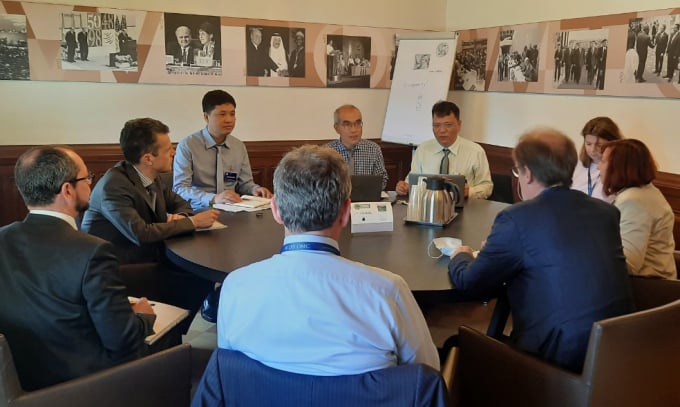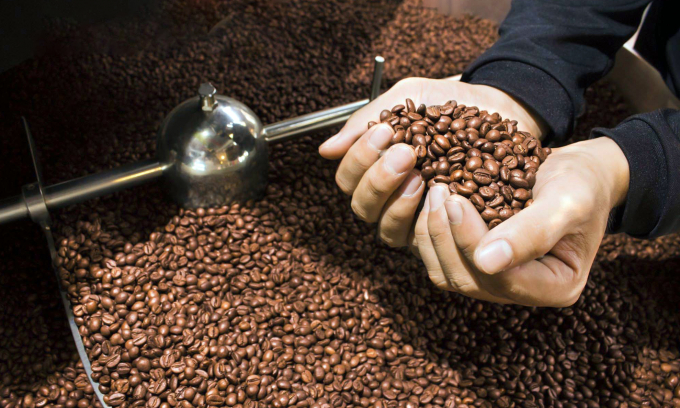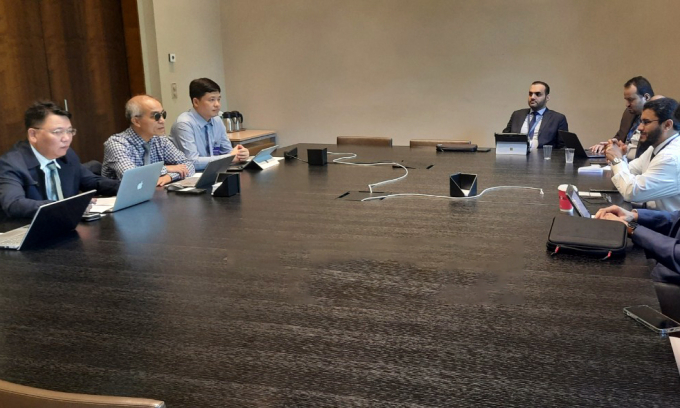June 17, 2025 | 22:21 GMT +7
June 17, 2025 | 22:21 GMT +7
Hotline: 0913.378.918
June 17, 2025 | 22:21 GMT +7
Hotline: 0913.378.918

Overview of the working session between the delegations of Vietnam and the EU.
On June 23rd (Geneva time, Switzerland), the delegation of Vietnam including the representative of the Permanent Delegation of Vietnam to the United Nations and the representative of the Ministry of Industry and Trade (led by Vietnam SPS Office) along with World Trade Organization (WTO) and other international organizations in Geneva held a bilateral meeting with the EU. This was a side event of the 83rd session of the WTO-SPS Committee taking place from June 22-24.
At the meeting, Dr. Ngo Xuan Nam, Deputy Director of SPS Vietnam Office, Head of the Vietnam Delegation, proposed the EU remove dragon fruit, coriander, basil (sweet), mint, parsley and okra from the list of products temporarily established practical identity inspection frequency.
The Vietnam delegation also demanded the EU review and provide data on the non-compliance rate of instant noodles related to the Ethylene oxide residue standards (from January 2022 to the present date).
Based on the assessment of compliance frequency to requirements and regulations on Ethylene oxide residues in the control process of businesses, the delegation proposed the EU side consider and remove control measures as prescribed to lessen the difficulties Vietnamese export enterprises were facing.
Apart from instant noodles, issues concerning the inspection frequency of dragon fruit and spices were also raised by the Vietnam delegation during the working session.
Dr. Ngo Xuan Nam said that there were no shipments of dragon fruits in 2021 that did not comply with EU SPS regulations. And in 2022 there had only been two consignments not conforming to regulations, including one consignment of "reduced organoleptic quality" and one consignment of excess Dithiocarbamate residues. It thus could be seen that Vietnam had performed quite well in controlling MRLs with pesticide residues.
“Dragon fruit is a signature agricultural product of Vietnam because it is grown in good soil and climate conditions, hence the outstanding quality. Vietnam attaches great importance to the quality and SPS issues of exported food in general and dragon fruit in particular. The government and relevant agencies of Vietnam have had many guidelines and policies related to this matter,” said Mr. Nam.

Among the main agricultural products exported to the EU in 2021, coffee occupies the highest proportion of 42.2%, next is cashew nuts with 33%. Rubber, vegetables and pepper together account for 7%.
Having listened to comments from the Vietnam side, Dr. Lorenzo Terzi, Head of EU Negotiating Delegation in the WTO-SPS Committee, said that the technical departments of Vietnam and the EU under the EVFTA needed coordination in reviewing statistics on EU warnings for Vietnam’s agricultural products. This would serve as a basis to reduce the frequency or even cancel inspections for Vietnam’s agricultural products.
“The EU side highly appreciates this working session, and if the Vietnamese side has statistical data on activities as well as cases of good compliance with SPS regulations, it can send it to the EU for reference,” said Dr. Terzi.
Benefiting from the EVFTA, Vietnam had been identified by the EU as a partner of priority. On that basis, the EU agreed that the contact points for the implementation of SPS commitments, in accordance with the spirit of the agreement, were the Vietnam SPS Office and the European Union Delegation to Vietnam. They would become a bridge to promote agricultural trade between the two sides.
The EU also suggested Vietnam review the application dossiers for opening the market for some products into Vietnam and go into further detail about regulations on food additives.
Periodically every six months the EU would review the list of food and feed products from third countries subject to the temporary strengthening of official controls at border checkpoints to ensure food safety. The next review would take place in December 2022.

Working session between the delegations of Vietnam and Saudi Arabia.
Also on June 23, the Vietnam delegation held a bilateral meeting with Saudi Arabia. The content of the meeting was about how to organize and inspect Vietnam's pangasius food safety and quality management system. The Vietnam delegation worked with Brazil on aquatic food additives, heat treatment regimes for processed shrimp; Pakistan on regulations for Aflatoxin in tea; the United Kingdom on the clarification of the new phytosanitary certificate form.
Translated by Samuel Pham

(VAN) The results of national programs are essential for establishing a contemporary livestock sector that is well-equipped to meet the demands of both domestic and international markets, with robust biosafety standards.

(VAN) The UNESCO Global Geopark revalidation of Non nuoc Cao Bang and the transition to a two-tier administrative model are presently undergoing a pivotal moment in Cao Bang, the northernmost province of Vietnam.
/2025/06/13/5330-2-004539_953.jpg)
(VAN) Changing policy mindset and removing investment barriers are urgent requirements to open up new development space for enterprises in the agricultural sector.

(VAN) The areas include the restoration of five million hectares of marine ecosystems.

(VAN) Dr. Le Van Nguyen, Director of the Institute of E-Commerce Management (ECM), emphasizes the potential for green development through the cultivation of fruit trees, particularly in provinces such as Son La.

(VAN) VAAS and numerous Vietnamese enterprises have signed cooperation agreements with Japanese partners to promote agricultural technology and trade connectivity.
/2025/05/29/5625-12-214801_567.jpg)
(VAN) Provincial mergers in the Mekong Delta promise to streamline administration, expand inter-provincial raw material areas, and foster close linkages in agricultural value chains, benefiting both businesses and cooperatives.